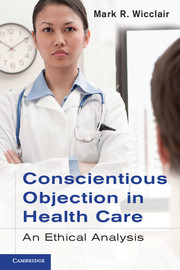WHAT IS CONSCIENTIOUS OBJECTION?
The subject of this book is conscientious objection in health care and the principal aim is to provide an ethical analysis of conscience-based refusals by physicians, nurses, and pharmacists. Before considering ethical issues, however, it is essential to understand what conscientious objection is, which calls for conceptual analysis.
A person engages in an act of conscientious objection when she refuses to perform an action, provide a service, and so forth, on the grounds that doing so is against her conscience. In the context of health care, physicians, nurses, and pharmacists engage in acts of conscientious objection when they: (1) refuse to provide legal and professionally accepted goods or services that fall within the scope of their professional competence, and (2) justify their refusal by claiming that it is an act of conscience or is conscience-based. But what is “conscience?”
Conscience
There are several conceptions of conscience. Some are religious and others are secular. According to some conceptions, conscience has an epistemological function. Such conceptions typically identify conscience as a faculty that discerns moral truths, distinguishes between right and wrong, and/or makes ethical judgments. This, for example, is Joseph Butler's conception of conscience:
[T]here is a superior principle of reflection or conscience in every man, which distinguishes between the internal principles of his heart, as well as his external actions; which passes judgment upon himself and them; pronounces determinately some actions to be in themselves, just, right, good; others to be in themselves evil, wrong, unjust: which without being consulted, without being advised with, magisterially exerts itself, and approves or condemns him, the doer of them, accordingly …
(Butler 1827: 53)